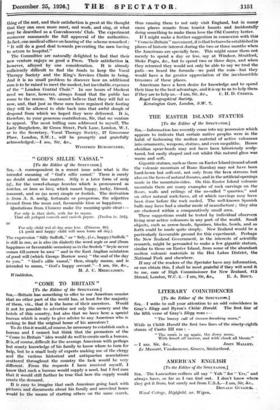" GOD'S SILLIE VASSAL "
[To the Editor of the SPECTATOR.] Sia,—A correspondent in a recent issue asks what is the intended meaning of " God's sillie vassal." There is surely no doubt about the matter. Silly is a later form of seely (cf., for the vowel-change breeches which is pronounced as britches, or been as bin), which meant happy, lucky, blessed, innocent, and so (as now) simple or foolish. The derivation is from A. S. saelig, fortunate or prosperous, the adjective formed from the noun sael, favourable time or happiness.
Quotations from Chaucer make the meaning quite clear :— For sely is that cloth, soth for to seyne, . That oft ycleped comoth and ondeth peyne. (Troilus iv. 503).
Or For rely child wol al day sone lore. (Prioress 60). (A good and happy child will soon learn all day).
The expression " Silly Suffolk," or " Sely, (i.e., happy) Suffolk" is still in use, as is also (in dialect) the word seyle or seal (from happiness or favourable occasion) as in the Scotch " Seyle never comes till sorrow be awa' " and in the East Anglian salutation of good will (which George Borrow uses) " the seal of the clay to you." " God's sillie vassal," then, simply means, and is intended to mean, God's happy servant."—I am, Sir, &c., M. J. C. MEIKLEJOIIN. Wimbledon.


































 Previous page
Previous page